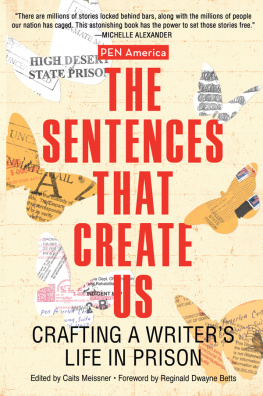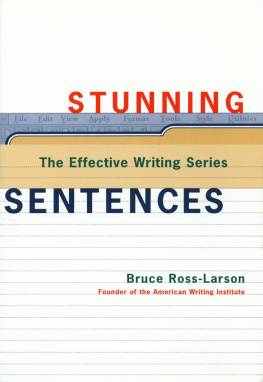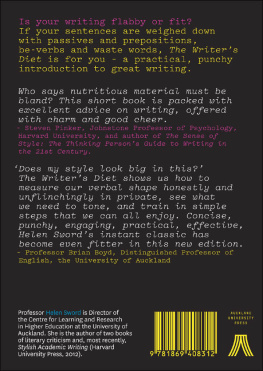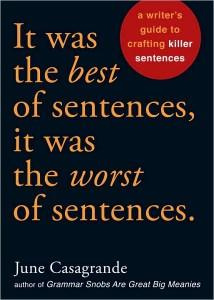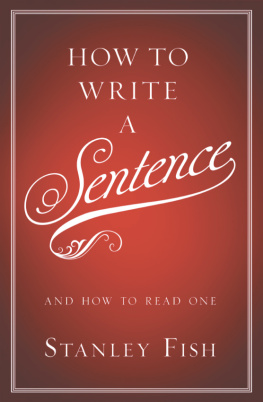Praise for The Sentences That Create Us
This is one of the best books on writing that Ive ever read. I couldnt put it down. There are millions of stories locked behind bars, along with the millions of people our nation has caged. This astonishing book has the power to set those stories free. And I believe the truths contained in those stories just might free us all.
Michelle Alexander, author of The New Jim Crow
When I was inside, I had no access to this manual. It didnt exist. And so, I scraped along the best way I could. I talked to friends who plotted out novels by riffing on rap albums. I talked to friends whod written hundreds of pages, by hand, fantasy novels that only they and I and those walking the yard would read. And we were all writers. But had we had this bookwe would have been better writers.
Reginald Dwayne Betts, from the foreword
The Sentences That Create Us feels like a cosmic reminder that the most radical, life-giving art is created and received from the inside to the inside(s). This book, unlike any other Ive read, takes seriously the beating hearts and curious minds behind the bars of a nation obsessed with punishing the most vulnerable.
Kiese Laymon, author of Heavy
A book rich with craft and the vitality of necessity. An essential collection and a gift to the world.
Nana Kwame Adjei-Brenyah, author of Friday Black
The Sentences That Create Us offers an illuminating array of tutorials and testimonials, reckonings and brass tacks. But above all, this volume is an homage to the power of writing to deliver each of us from our individual confines into the soaring infinity of our imaginations.
Jennifer Egan, author of A Visit from the Goon Squad
Not only a powerful guidebook for all who are curious about developing a writing practice, this radical collection also demonstrates how people surviving and resisting the prison industrial complex of writing lives and communities behind bars, definitions of key concepts and terms, and samples and examples across genres (from poetry to journalism and more), this fierce resource equips readers with all the tools to write ourselves into freedom.
Erica R. Meiners, coauthor of Abolition. Feminism. Now.
Having taught college-level English courses in prison for more than a decade, I am thrilled for a volume like this one: chock full of prose that is not only beautiful, inspirational and wise, but hugely helpful in a pedagogical sensea perfect addition to all syllabi that involve writing in the carceral space.
Baz Dreisinger, author of Incarceration Nations
The Sentences That Create Us, PEN Americas new handbook, is both metaphor for the system and means of reinterpreting it. These writers made on the insidereveal the many ways that denial of a creative intellectual life on the outside is one of the pillars of our current carceral dependency. Shooting stars on every page, this book is instructional beyond its promise. Through it, we may just learn that we have always had better solutions than bars and walls.
Gina Dent, coauthor of Abolition. Feminism. Now.
The Sentences That Create Us is a wonderful immersive guide into the world of writing (and reading) that will explain, reinterpret and transform genres you thought you knew. It is a profound reminder that writing, when nurtured by those denied, has redemptive power not only to examine and interpret our lives, but also to change them.
Donna Murch, author of Assata Taught Me
Take advantage of every word, Caits Meissner tells readers of this powerful anthology. Its authors certainly have. The Sentences That Create Us is a practical tool of the ways currently and formerly incarcerated people and their allies, gifted writers all, seize the written word to do what prison refuses: celebrate the human. Here is a moving, hands-on guide to freedom writing.
Dan Berger, author of Captive Nation
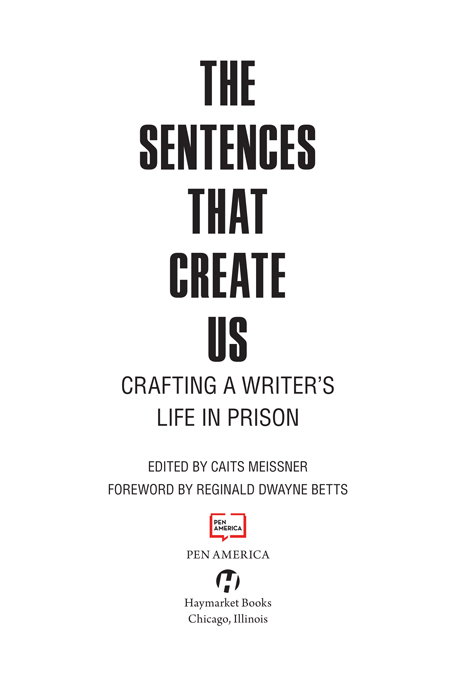
2022 Caits Meissner
Published in 2022 by
Haymarket Books
P.O. Box 180165
Chicago, IL 60618
773-583-7884
www.haymarketbooks.org
ISBN: 978-1-64259-677-9
This is a project of PEN America, conceived, developed, and edited by the PEN America Prison and Justice Writing Program. The views and experiences presented by the contributors are theirs alone and do not represent those of PEN America.
Distributed to the trade in the US through Consortium Book Sales and Distribution (www.cbsd.com) and internationally through Ingram Publisher Services International (www.ingramcontent.com).
This book was published with the generous support of Lannan Foundation and Wallace Action Fund.
Special discounts are available for bulk purchases by organizations and institutions. Please email for more information.
Cover design by Melissa Joskow.
Library of Congress Cataloging-in-Publication data is available.

To you who holds this book, to you who holds the pen.
About PEN America
Founded in 1922, PEN America stands at the intersection of literature and human rights to protect free expression in the United States and worldwide. Our membership forms a nationwide community of writers and literary professionals, as well as devoted readers and supporters who join with them to carry out PEN Americas mission. PEN America advocates for writers under threat worldwide and public policies that bolster freedom of speech; celebrates the literature of eminent and emerging writers through awards, publications, festivals, and public programming; produces original research on pressing threats to free expression; and offers platforms to lift up the work and views of those whose voices have too often gone unheard or been ignored. PEN America is the largest of the more than one hundred centers worldwide that comprise the PEN International network. To learn more, please visit pen.org.
PEN Americas Prison and Justice Writing Initiatives
PEN Americas Prison Writing Program, founded in 1971 in the wake of the Attica riots, advances the transformative possibilities of writing and has offered many thousands of incarcerated writers free access to literary resources, skilled writing mentors, and audiences for their work. Our program extends PEN Americas mission of supporting free expression and encourages the use of the written word as a legitimate form of power. Historically named the PEN Prison Writing Program, which is now used interchangeably with PEN America Prison and Justice Writing, our initiative is among the largest and longest-running outlets of free expression for the countrys incarcerated population. It is made possible by the support of generous donors.
Outside of this publication, which is made available for free to anyone incarcerated, our signature offerings include the following:
Prison Writing Contest: Anyone incarcerated in the year before the September 1 deadline is eligible to enter in the categories of poetry, fiction, drama, nonfiction, and memoir. Awards are made for first, second, third, and honorable mention places. We receive over one thousand entries annually. Winners receive modest cash prizes, and their work is brought to new audiences through publication on PEN Americas website, a print anthology, and public readings delivered by celebrated authors on the outside.
Next page
